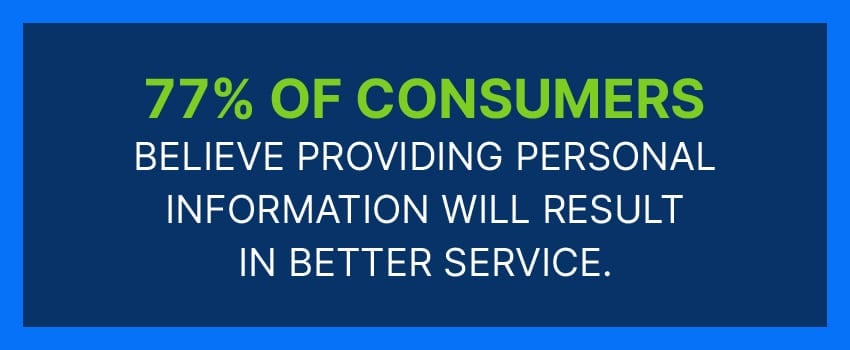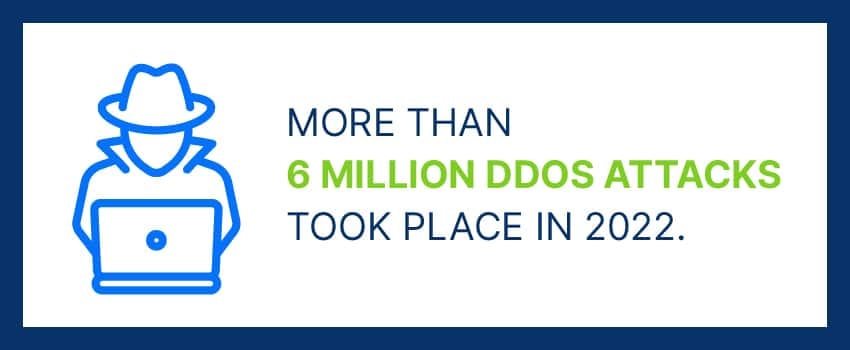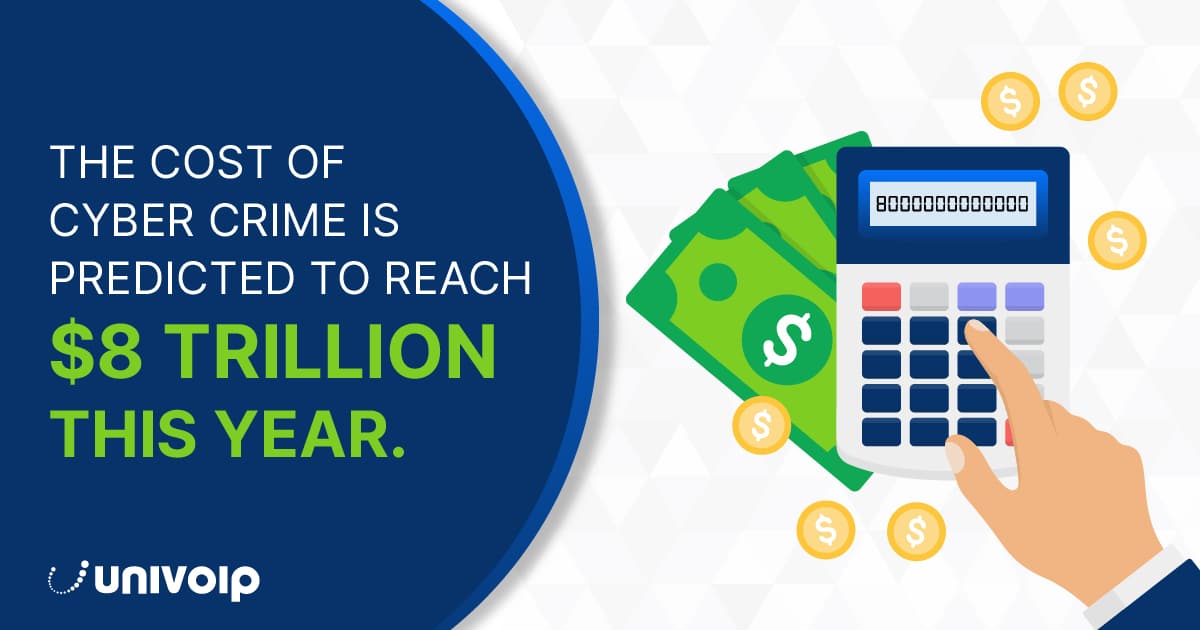Data security should be a top priority when choosing a cloud contact center solution for your business. Experts predict the total cost of cybercrime will reach $8 trillion this year.1 And considering 77% of consumers are willing to provide personal information for a better service experience,2 ensuring your contact center has the tools needed to keep this data safe is critical.
Cloud contact centers offer businesses many advantages, including increased scalability, cost savings, customer satisfaction, and flexibility. However, with the convenience of cloud technology comes new security and compliance challenges to consider.
In this blog, we discuss compliance and data security considerations when choosing a solution, top cloud contact center best practices for security, and how to find the right cloud provider.
What Is Contact Center Compliance?
Contact center compliance refers to the policies, procedures, and technologies a contact center must follow to adhere to legal, regulatory, and industry-specific standards when handling customer data. These regulations—such as TCPA, GDPR, HIPAA, and PCI-DSS—are designed to protect consumer privacy, ensure secure communications, and prevent misuse of sensitive information.
Staying compliant means more than avoiding fines or legal action—it builds trust with customers and protects your brand’s reputation. In a cloud contact center environment, compliance also involves ensuring that all communication channels—voice, chat, email, and SMS—are secured and monitored according to current data protection laws.
Why Compliance Matters in Cloud Contact Centers
Cloud contact centers must meet several regulatory compliance requirements that aim to maintain the privacy and security of customer data. Failure to comply with regulations can result in severe consequences for your business, such as:
Fines and Penalties
Legal Action
Loss of Customer Trust
Operational Disruption
[inline graphic: 77% of consumers believe providing personal information will result in better service.]

Common Security Challenges in Cloud Contact Centers
As more businesses move to cloud-based contact center solutions, new security and compliance risks emerge. Below are some of the most pressing security challenges in cloud contact centers to be aware of:
1. Remote Work and Distributed Teams
Cloud contact centers enable flexible, remote operations—but they also increase the risk of unauthorized access. Without strict authentication protocols and secure devices, remote agents can unintentionally expose sensitive data.
2. Data Residency and Compliance
Different regions have varying data protection laws. If your cloud provider stores data in another country, you may face compliance risks with regulations like GDPR, HIPAA, or CCPA.
3. Third-Party Integrations
Many contact centers rely on third-party CRMs, analytics, or communication tools. These integrations can become potential entry points for attackers if not properly vetted and secured.
4. Limited Internal Security Expertise
Not all companies have in-house cybersecurity experts. Without the right skills and tools, contact centers may struggle to implement best practices for cloud contact center security and maintain compliance.
Contact Center & Call Center Regulations
Many companies aren’t aware of the compliance requirements surrounding how their contact center handles sensitive data. Avoid accidental non-compliance by staying up-to-date on the regulations your business must comply with. Some regulations that might apply to your cloud contact center include:
Telephone Consumer Protection Act of 1991 (TCPA)
The TCPA is a federal law regulating telemarketing calls and other unsolicited phone calls. Under the TCPA, cloud contact centers are required to obtain consent from consumers before making unsolicited calls or sending text messages to their phone numbers. The law also requires companies to honor a consumer’s request to opt-out of receiving further calls or messages.
STIR/SHAKEN
STIR/SHAKEN is an FCC framework of standards designed to combat illegal caller ID spoofing, a technique scammers use to make it look like their calls are coming from legitimate businesses or government agencies. Contact centers are required to implement STIR/SHAKEN protocols to the Internet Protocol (IP) portions of their networks, per FCC rules.
Reassigned Number Database (RND)
The RND was created in response to concerns that companies were calling or texting numbers that had been reassigned to other people, resulting in complaints and regulatory violations. Companies can use the database to determine if a phone number has been reassigned and avoid calling customers who don’t want to receive calls.
RAY BAUM’s Act and Kari’s Law
RAY BAUM’s Act and Kari’s Law are two pieces of legislation aimed at improving emergency communications in the U.S. RAY BAUM’s Act requires contact centers to provide a “dispatchable location,” such as a building number or floor level, for 911 calls made from indoor locations. Kari’s Law requires all multi-line telephone systems (MLTS) to allow users to dial 911 without having to use a prefix or other code to reach an outside line first.
Common Security Threats in Cloud Contact Centers
Cloud contact centers face a wide range of security threats that can compromise customer data and bring operations to a halt. Here are some common cyber security threats to be aware of:
Phishing Attacks
Phishing attacks rose by 61% in 2022.3 Cyber criminals use this type of attack to trick employees into sharing privileged information or downloading malware, which can be particularly dangerous in cloud contact centers as attackers may gain access to customer data.
Distributed Denial of Service (DDoS) Attacks
More than 6 million DDoS attacks took place last year.3 These attacks overload a system with traffic, making it unavailable to users. In cloud contact centers, DDoS attacks can disrupt business operations and prevent customers from accessing services.
Malware and Ransomware
Insider Threats

Cloud Contact Center Security Best Practices
Follow the cloud contact center best practices below to ensure your customers’ sensitive information stays protected.
1. Implement Multi-Factor Authentication
Multi-factor authentication (MFA) adds a layer of network security by requiring users to provide more than one form of authentication, such as a password and a security token. By requiring employees and third-party vendors to use MFA when accessing contact center applications and systems, you can reduce the risk of unauthorized users breaching your network.
2. Monitor Cloud Access
Identity and access management (IAM) tools can help your IT teams monitor who has access to cloud contact center systems and applications. Additionally, least-privilege access policies can be deployed to limit access to only the users who need it.
3. Encrypt Sensitive Data
Data encryption converts a company’s data into a coded message that can only be read by someone with the right key or password. Implementing encryption protocols can help your cloud contact center protect sensitive information from unauthorized access, interception, or theft.
4. Regularly Perform Security Audits
By performing security audits, you can identify potential vulnerabilities and implement measures to mitigate them – before hackers find them. Be sure to scan for malware and other unauthorized software regularly, and keep your technology and critical components up-to-date with the latest security patches.
5. Train Employees on Best Practices
Training employees and informing them of contact center security best practices is critical, especially considering 82% of breaches involve a human factor.5 Make sure your team is aware of cyber security best practices, such as how to create strong passwords, report suspicious activity, and avoid phishing scams.
On-Prem vs. Cloud Contact Center Security
When evaluating the right contact center model for your business, understanding the differences in security between on-premises and cloud-based solutions is critical.
Infrastructure Management
On-prem contact centers require your in-house team to manage servers, security updates, and physical infrastructure. This means more control, but also more responsibility and higher overhead.
Cloud contact centers, on the other hand, are hosted and maintained by providers who specialize in security and ensure infrastructure is continuously updated and monitored.
Scalability and Response Time
Security scaling can be slow in on-prem systems, especially when new threats emerge. In contrast, cloud providers can rapidly deploy security patches and adapt to evolving threats with minimal disruption to operations.
Built-in Security Features
Cloud contact center platforms typically include enterprise-grade security tools—like encryption, access controls, and compliance frameworks—out of the box. On-prem systems often require custom setups or third-party tools to match this level of protection.
Disaster Recovery and Redundancy
Cloud platforms offer automatic backups and built-in redundancy, reducing the risk of data loss during a breach or outage. With on-premises setups, disaster recovery planning falls entirely on your internal teams
Cloud Call Center Software Security Features to Look For
Choosing secure software is essential for protecting your customers’ data and maintaining regulatory compliance. Below are key cloud call center software security features to prioritize:
1. Compliance Certifications
Ensure your provider meets industry standards like SOC 2, HIPAA, GDPR, or PCI-DSS. These frameworks show that the platform follows strict data security and privacy protocols.
2. End-to-End Encryption
Protect sensitive voice and text communications with strong encryption—both in transit and at rest. Look for platforms that also secure call recordings.
3. Role-Based Access Control (RBAC)
Limit system access based on user roles. RBAC helps reduce insider threats and keeps sensitive data available only to authorized personnel.
4. Zero Trust Architecture
Adopt a platform that supports a Zero Trust approach—requiring constant verification of users, devices, and applications to minimize breach risk.
5. Real-Time Monitoring and Alerts
Look for built-in monitoring tools that provide visibility into login activity, system changes, and suspicious behavior—allowing you to respond quickly to threats.
UniVoIP: Your Partner for Scalable, Secure Cloud Contact Center Solutions
One of the simplest ways to protect your business is to work with a cloud contact center provider that takes data security seriously. The right provider can offer a secure infrastructure with integrated security tools like firewalls or access controls, data backup, and disaster recovery solutions. Plus, they can leverage their expertise to help your contact center meet and maintain regulatory compliance.
UniVoIP’s cloud contact center solutions are designed to protect customer data. We use end-to-end data security protocols, voice encryption, and enterprise-level firewalls to safeguard your network. Our platform is also equipped with advanced management tools that provide a complete view of your contact center activities, so you can have peace of mind knowing your data is always secure.
Contact UniVoIP today to learn more about how our omnichannel cloud contact center solutions can help your business deliver a seamless and secure customer experience.
Sources:
- https://www.forbes.com/sites/chuckbrooks/2023/03/05/cybersecurity-trends–statistics-for-2023-more-treachery-and-risk-ahead-as-attack-surface-and-hacker-capabilities-grow
- https://website-assets-fw.freshworks.com/attachments/ckset8cvb016wehfz1sz02eyz-deconstructing-delight-freshworks.pdf
- https://www.techtarget.com/whatis/34-Cybersecurity-Statistics-to-Lose-Sleep-Over-in-2020
- https://techjury.net/blog/insider-threat-statistics
- https://www.verizon.com/business/resources/reports/dbir/



